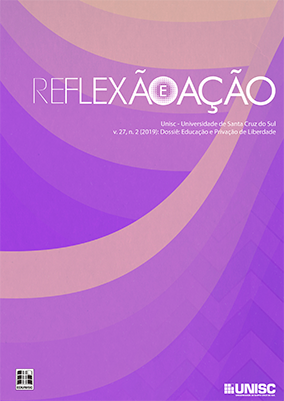EDUCACÃO EM PRISOES: PRÁTICA ALIENANTE OU LIBERADORA
DOI:
https://doi.org/10.17058/rea.v27i2.12539Palavras-chave:
Prisão, Educação, Analise de discurso, Analise institucional, Instituições.Resumo
As práticas educativas, dentro das prisões, podem ter um papel alienante, no sentido de se inscrever em um propósito resocializante, ou um potencial liberador, na medida em que favoreça a reflexão sobre as condições de vida dos sujeitos e amplie a possibilidade de transforma-las. Este artigo toma como referência algumas dessas práticas desenvolvidas na prisão de Villahermosa, da cidade de Cali, Colômbia, considerando particularmente os textos que fundamentam o projeto denominado Missão caráter, e as analisa tomando como referência à análise institucional e a análise de discurso. Esta análise se inscreve numa crítica geral aos sistemas penitenciários e sua funcionalidade e mostra como esses discursos, de caráter moralista, reforçam um instituído cujas práticas pretendem a conversão moral dos sujeitos presos.Downloads
Downloads
Publicado
Como Citar
Edição
Seção
Licença
A submissão de originais para este periódico implica na transferência, pelos/as autores/as, dos direitos de publicação impressa e digital. Os direitos autorais para os artigos publicados são do/a autor/a, com direitos do periódico sobre a primeira publicação. Os/As autores/as somente poderão utilizar os mesmos resultados em outras publicações indicando claramente este periódico como o meio da publicação original. Em virtude de sermos um periódico de acesso aberto, permite-se o uso gratuito dos artigos em aplicações educacionais e científicas desde que citada a fonte conforme a licença CC-BY da Creative Commons. Creative Commons Atribuição 4.0 Internacional.
Creative Commons Atribuição 4.0 Internacional.


